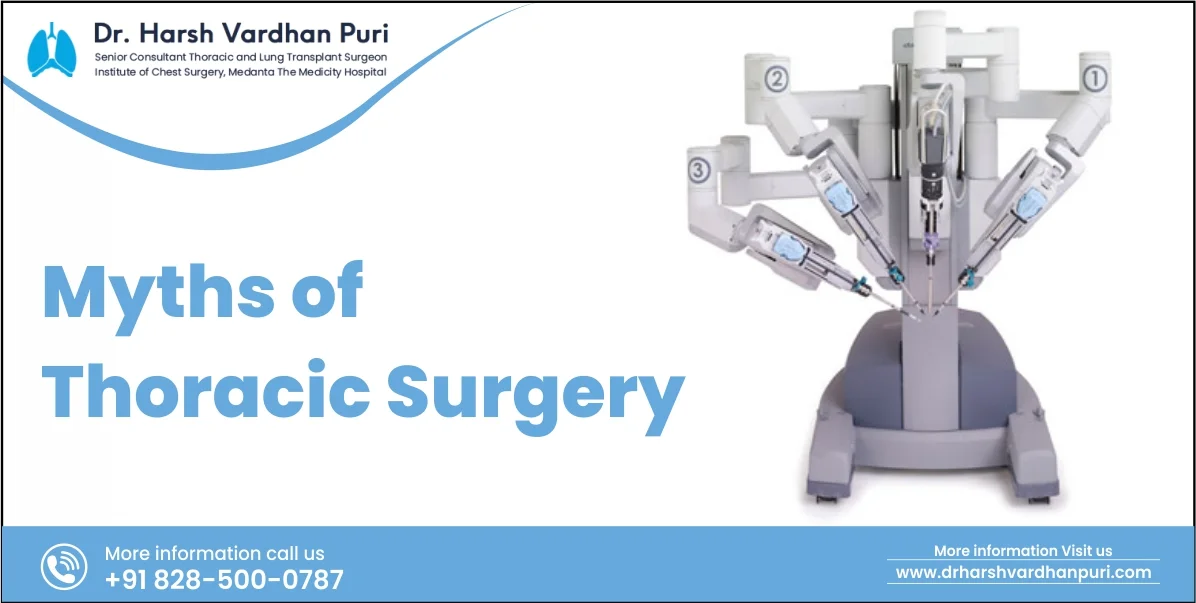CH Baktawar Singh Rd, Medicity, Islampur Colony, Sector 38, Gurugram, Haryana 122001
28 December, 2023

Many fallacies about thoracic surgery exist, which might skew people’s understanding of the methods and results of the treatment. Notwithstanding developments, these misconceptions continue to spread false information about the characteristics and effectiveness of thoracic procedures. Dispelling these myths is essential to provide people with accurate information about the true nature of these operations, as well as their advantages and possible consequences. In order to provide a better knowledge of thoracic procedures as well as to help individuals considering these procedures make educated decisions, we will examine and debunk such common misconceptions.
Despite what many people think, open incisions are not usually required for thoracic surgery. Today, advances in the field of medicine, especially in the form of surgical techniques that are minimally invasive, changed the impression of these surgeries, they are still generally associated with huge incisions.
Small incisions are made during such minimally invasive treatments, which minimise scarring, hasten healing, and lessen discomfort following surgery. Accuracy is achieved in the execution of complex thoracic procedures by thoracic surgeon in gurgaon using specialised devices and high-definition cameras. It is imperative to dispel this misconception and acknowledge that contemporary thoracic surgery employs minimally invasive techniques, providing patients with less discomfort, expedited recuperation, and enhanced results.
Despite what the general public believes, thoracic surgery advances, particularly minimally invasive methods including VATS and robotic-assisted surgery, have significantly decreased postoperative discomfort and expedited recuperation. Thoracic surgery is frequently portrayed in traditional myths as being extremely painful and necessitating a protracted recovery period. Smaller incisions are used in current operations, though, which leads to less tissue damage, less discomfort, and faster recovery periods.
Compared to typical open operations, patients receiving such minimally invasive treatments frequently return to their regular activities sooner and their stays in the hospital are shorter. Surgeons use high-definition cameras and precision tools to perform precise surgeries with the least amount of tissue disturbance possible.
Although each patient’s experience is unique, contemporary thoracic surgery aims to reduce pain and speed up patients’ recuperation, dispelling the myth that these operations cause excruciating agony and need a lengthy recovery period.
There’s a widespread misperception that all thoracic operations include intrusive procedures and high dangers. Though minimally invasive treatments have been provided by medical technology improvements, surgery still requires incisions to reach the chest region. Small incisions and specialised devices are used in procedures like robotic-assisted surgery and VATS (Video-Assisted Thoracic Surgery), which minimises invasiveness and postoperative pain.
Improvements have also significantly reduced the hazards associated with surgery. Compared to open procedures, these methods include less blood loss, less discomfort, faster recovery periods, and fewer problems.
Thoracic procedures are becoming less intrusive and more secure for numerous patients thanks to these minimally invasive techniques that combine modern equipment and a surgeon’s skill to maximise precision while lowering risks.
It’s crucial to remember that surgical procedures are advised based on a variety of parameters, not only the severity of the ailment, despite the common misconception that thoracic surgery is only for serious conditions. Surgery is frequently required for serious situations, but it can also be beneficial for lesser ailments or the initial stages of disorders to avoid consequences or aggravation of the condition.
Not only are thoracic surgeries performed in emergency situations, but on certain occasions, it’s employed as a prophylactic or to treat underlying problems before they worsen. Advances in minimally invasive procedures have made surgery more viable for a wider range of illnesses, even those deemed less serious. This method guarantees better results, enhances the person’s standard of life, and stops the advancement of illnesses.
Several people believe that thoracic surgery is a single-source treatment for every kind of lung-related ailment and that it will always result in a full recovery. Actuality is a little bit different and complicated than that, though. Although thoracic surgery is a necessary as well as useful therapy alternative, there are different numbers of variables that might affect the surgery’s outcome. A number of factors, including the exact kind, phase of the disease, the patient’s general state of health, and how well they respond to post-procedure treatment, affect how successful the surgery is.
In some situations, as a component of a complete treatment strategy, operations are used in addition to other therapies including radiation and chemo. It is important to understand that having surgery may not necessarily imply a complete recovery. Patients are better equipped for making decisions regarding their treatment strategy when they have reasonable expectations and are aware of the potential benefits and drawbacks of the surgery. A thorough understanding enables people to investigate every possibility for successfully controlling their lung diseases.
Myths surrounding thoracic surgery often obscure our knowledge of available treatments. People may make better-educated judgments regarding their health by dispelling these myths. Consulting with specialists such as Dr. Harsh Vardhan Puri is crucial as they can offer extensive knowledge regarding thoracic surgery. Patients may choose the most appropriate line of treatment for their lung diseases by understanding the alternatives, weighing the benefits and drawbacks, and making an informed decision. Seeking advice from experts such as Dr. Puri guarantees that patients get the most accurate information possible to make educated decisions about their thoracic health.
Category : Thoracic Surgery
Tags: